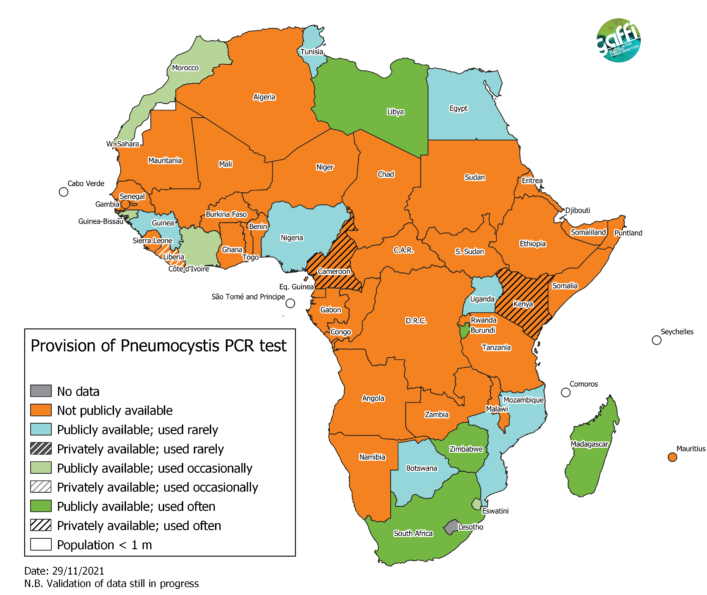
On World AIDS Day, experts call for global commitment towards the purchasing of diagnostic tests for Pneumocystis pneumonia (PCP), a respiratory fungal infection responsible for a high proportion of deaths among HIV positive children and adults in Africa.
A recent survey conducted by GAFFI assessing the availability of WHO listed essential diagnostics for fungal diseases has found that out of 47 countries surveyed, just six countries in Africa have access to the high-quality point of care diagnostic tool PCP PCR – a molecular technique used for identification of the Pneumocystis fungus.
Only Burundi, Ethiopia, Libya, South Africa, Madagascar and Zimbabwe reported routine use of Pneumocystis PCR, limiting coverage to just 18% of the collective population of all countries surveyed. Thirty-one countries (66%) have zero diagnostic capability for PCP PCR (population 718 million), with utility being ‘occasional or rare’ in 21% or ten countries.
The unavailability of this essential diagnostic across Africa inevitably results in a high number of missed cases of PCP. Without timely diagnosis and treatment, PCP in AIDS is fatal; over-treatment leads to much toxicity and medicine side effects.
Experts have proposed the following steps to help address the unmet need in HIV/AIDS patients predisposed to PCP:
- Enable all African countries to diagnose patients with Pneumocystis pneumonia by increasing capability for PCP PCR testing, leveraging existing PCR capability
- Infrastructure developments to support PCP patients, including radiology, laboratory services and critical care beds
- Education of healthcare workers looking after HIV patients to consider and test for PCP
- Provision of effective second line drugs to treat PCP – clindamycin and primaquine, as 20-30% of patients fail or get serious toxicity with high dose cotrimoxazole, the first line agent.
PCP is caused by Pneumocystis jirovecii, a fungus that is supremely adapted to living in the lungs and has co-evolved with humans. Its growth accelerates in individuals with weakened immune systems and frequently manifests as an AIDS-defining illness. An estimated 200,000-500,000 cases of PCP are estimated to occur annually across the globe, with the largest proportion of these preventable deaths occurring in Africa due to its high HIV/AIDS burden.
HIV positive children are particularly susceptible to PCP, with 21% of child deaths in this group attributed to this disease. Despite these stark statistics, little attention is given towards targeted interventions for PCP diagnosis and treatment for children in global HIV guidelines contributing to excess child mortality.
Emma Orefuwa, GAFFI’s Director of Programmes for Africa said: “Significant gains have been made in the fight against HIV and AIDS, however in many parts of Africa, patients may present late or have issues with access or adherence to antiretroviral drugs. These individuals are at heightened risk of developing PCP which is woefully undiagnosed. Access to PCP diagnostics would contribute to saving many lives.’
GAFFI calls on all partners, donors and governments to support the introduction of PCP diagnostics across laboratory networks and HIV programs. The global health community must promote further research to understand the impact of this disease in Africa.